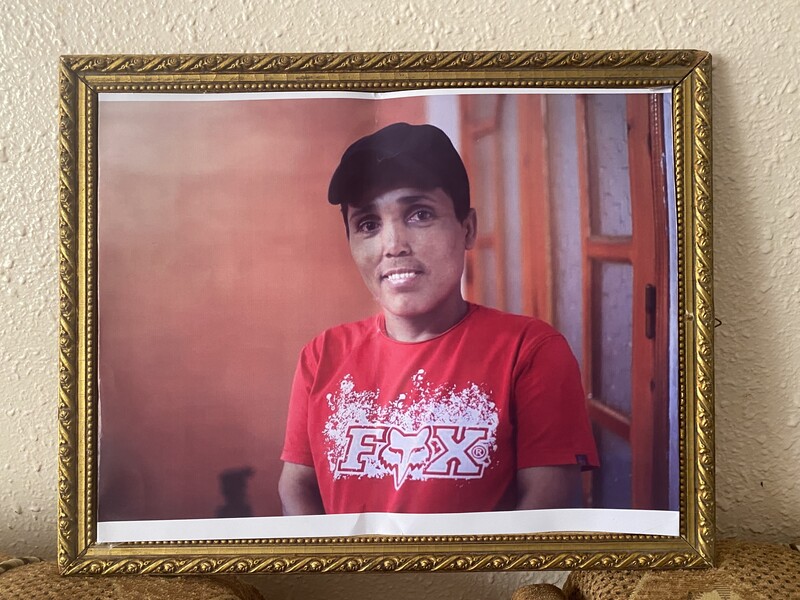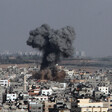The Electronic Intifada 24 May 2022

Ashraf Humeid worked until the end to support fellow thalassemia patients.
EIٌRamadan Muhra, 39, died after five months of illness and deteriorating health.
Muhra had thalassemia. Untreated, it can kill you. And untreated is what Muhra went after Gaza’s hospitals ran out of the medicine he needed to manage his condition.
And he isn’t the only one.
In all, ten thalassemia patients have died since the start of the year, according to Gaza’s Thalassemia Patients’ Friends Society, a support group.
This situation has arisen because the treatment they need is simply unavailable in Gaza, 15 years after Israel imposed a punishing blockade on the coastal strip, and the two main Palestinian factions, Fatah and Hamas, fought each other into a still-lasting political division between Gaza and the West Bank.
Muhra eventually displayed all the expected symptoms after six months of not receiving treatment. His skin turned dark, his face swelled, and he developed osteoporosis. Both heart and liver suffered extensive damage as a result of an excess of iron in his body.
“My cousin was stronger than we imagined,” said Muhammed Muhra, 50. “He fought his illness until his last breath, and even though his health was deteriorating steadily, he never lost hope that he would receive his therapy and recover.”
Thalassemia is a congenital blood disease that is particularly prevalent in South Asian, South East Asian, Mediterranean and Middle Eastern people. It is caused by a genetic abnormality that causes low hemoglobin levels, resulting in anemia and an excess of iron in the blood.
Anemia is treated with blood transfusions, while medicine is used to control iron levels.
One of the most important medicines for people with the condition is deferoxamine, in Gaza sold under the trade name, desferal.
Desferal helps remove excess iron caused by the regular blood transfusions thalassemia patients need, protecting vital organs from damage.
But stores of desferal ran out in Gaza at the beginning of the year, putting the lives of Gaza’s thalassemia patients at risk.
Ramadan Muhra had been bedridden for months and was unable to walk, according to Muhammad. By the end, he had lost a lot of weight and suffered fatigue and constant abdominal pain.
Muhammad, a satellite technician, is angry because his cousin’s death didn’t have to happen. It was, he said, “deliberate murder.”
“He didn’t die like the majority of people do. He died of a lack of medicine caused by a political struggle between the two Palestinian governments.”
Occupation and division
Ibrahim Abdallah, who is a coordinator with the Gaza Thalassemia Patients’ Friends Society, which organizes a variety of health and community events for Gaza’s just over 300 thalassemia patients, also blamed the divided Palestinian authorities.
Israeli restrictions on the import of medicine or the movement of patients have played an enormous part. Al Mezan, a human rights organization, in February found that 39 percent of vital medicines in Gaza were at zero stock, with less than a month’s supply left.
But in addition to those restrictions, the availability of medicine has noticeably dropped since the 2007 separation of authorities.
According to Gaza’s ministry of health, the Fatah-dominated Palestinian Authority in the occupied West Bank now provides just 20 percent of required medicines in Gaza. The Hamas government in the occupied Gaza Strip provides another 20 percent, while charities try to fill the shortfall, providing some 40 percent.
It is not enough, and while Abdallah said he understood its difficult position, he also said Hamas needs to address this situation with urgency since it is in charge of Gaza.
Between them, he continued, Fatah’s PA and the Hamas government in the Gaza Strip have worsened Gaza’s medical crisis and put people’s lives in jeopardy, including those with thalassemia.
Stocks of desferal ran out at the beginning of the year, putting scores of people’s lives at risk, he added.
In the meantime, Abdallah’s thalassemia society has tried to secure supplies from elsewhere.
“We received the first batch of 10,000 packets of desferal from a charity organization in Kuwait. The second batch of 4,000 packets is expected soon,” he said. “These will last for a few months, and then we’ll be back to the same crisis.”
Abdallah, himself a thalassemia patient, urged both Palestinian authorities to put their differences aside to address the acute lack of medicine that is “killing our patients.”
“They each blame the other for this crisis.”
Not our fault
According to officials in both the Gaza Strip and the West Bank, the COVID-19 outbreak has exacerbated a crippling financial imbalance, prohibiting them from obtaining many treatments.
The financial squeeze that the Gaza ministry of health has dealt with since the blockade has prevented it from obtaining and providing the required amount of medications in a timely manner, according to Alaa Helles, a ministry spokesperson.
That crisis only worsened as the pandemic spread.
“We are doing our best to provide medicine to everyone,” he said, “but our resources and budget are limited.”

Sawsan al-Masri, here flanked by two siblings, is now receiving only half the recommended dose of medicine she needs.
EIAccording to Ossama al-Najjar, a health ministry official in Ramallah, since last year, when Swiss pharmaceutical company Novartis suspended sales to the PA due to outstanding debts, the ministry has been unable to distribute a number of medicines.
“We are in the midst of a horrific financial crisis brought on by the two-year COVID-19 pandemic, which has rendered us unable to even acquire the cheapest medicine,” he added.
“There are companies and foundations who purchase these drugs on a regular basis and donate them to us,” Al-Najjar explained, “but that is also held up” because of the pandemic.
But he rejected accusations that Ramallah was in any way deliberately holding up the delivery of medicine.
“As soon as the medicine is accessible in warehouses,” he said, “it will be transferred to Gaza.”
Struggling with illness
Ashraf Humeid was 37 when he died last September of serious medical complications after a protracted struggle with thalassemia.
Humeid had received just six out of the 12 shots per month he should normally have received in the 14 years up until he died as a result of the shortage of medicine.
As the Palestinian economy deteriorated even further last year, this was reduced to two injections per month until supply in Gaza was completely depleted.
Abdallah, who knew him well because of the Friends Society, said the two shots were simply insufficient for Humeid to live healthily.
But he never complained.
“Even as his health deteriorated and the medicine ran out, he fought and attempted to hide his pain from us,” Abdallah said. “But we observed how exhausted he appeared.”
Humeid was eventually diagnosed with renal failure, resulting in an enlarged spleen and ultimately heart failure.
Despite his sickness and its significant complications, he worked until the end for other thalassemia patients as a coordinator for the Thalassemia Patients’ Friends Society.
“Ashraf dreamed of protecting future generations from this illness, so he decided to work with us in the association,” Abdallah said.
“He was in charge of the association’s awareness-raising program, which included holding events in Gaza’s universities and other public places to educate young people about the importance of premarital medical examinations in the reduction of thalassemia.”
According to Abdallah, such events have helped to gradually reduce the number of babies born with thalassemia from 40 to nearly zero in the last ten years.
“The program was named after him after his death, in his honor and for his unforgettably heroic efforts on behalf of Palestinian patients,” Abdallah said.
Desperate patients
Many thalassemia patients in Gaza have despaired of receiving treatment and dread losing their lives.
Sawsan al-Masri, 32, is worried about becoming the next victim of the desferal drug shortage.
Like Humeid, al-Masri now only receives a twice-weekly injection. Her face has turned pale and her muscles have become weak, leaving her unable to move well or leave her home.
Furthermore, she suffers occasional nose bleeds and her teeth have begun falling out. Her liver is now enlarged and she has developed cardiomyopathy – a weakening of the heart muscle – over time.
“The desferal medicine is a miracle for me because it makes me feel like a regular person who can do anything I want,” she told The Electronic Intifada. “Without it, I’m slowly dying.”
Since desferal ran out, al-Masri has received an alternate drug, but it has so far failed to prove particularly beneficial. She has already lost 10 of her closest friends to the disease in a matter of months.
“Before I couldn’t leave the house, I kept going to the hospital hoping to find the medicine and to return to a normal life like everyone else,” she said. “I was always disappointed.”
“And I have no idea who will be the next. Perhaps it will be me.”
Israa Sulaiman is a writer with We Are Not Numbers
Khuloud Rabah Sulaiman is a journalist living in Gaza.





